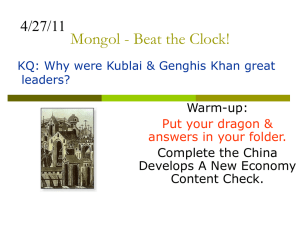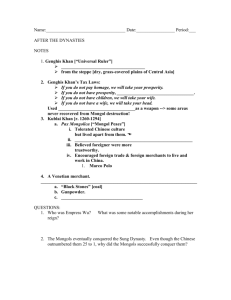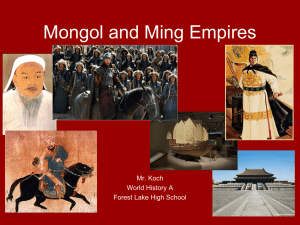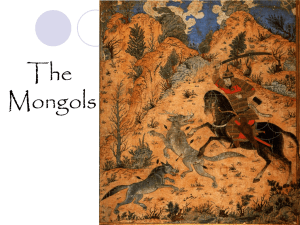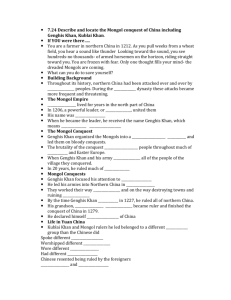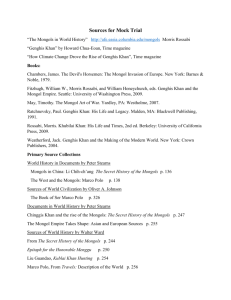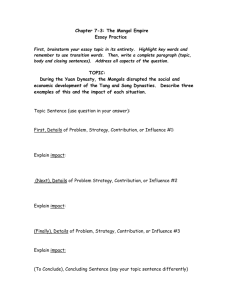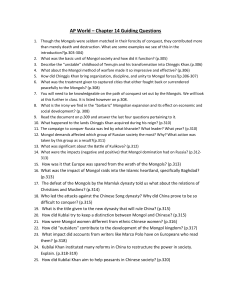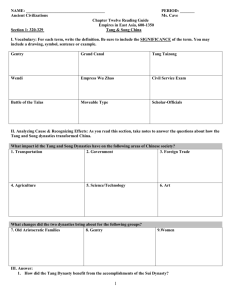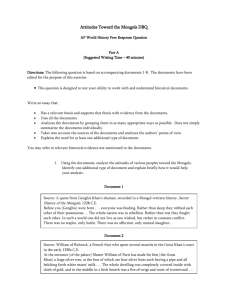How did the Mongol conquests of China impact the culture and
advertisement
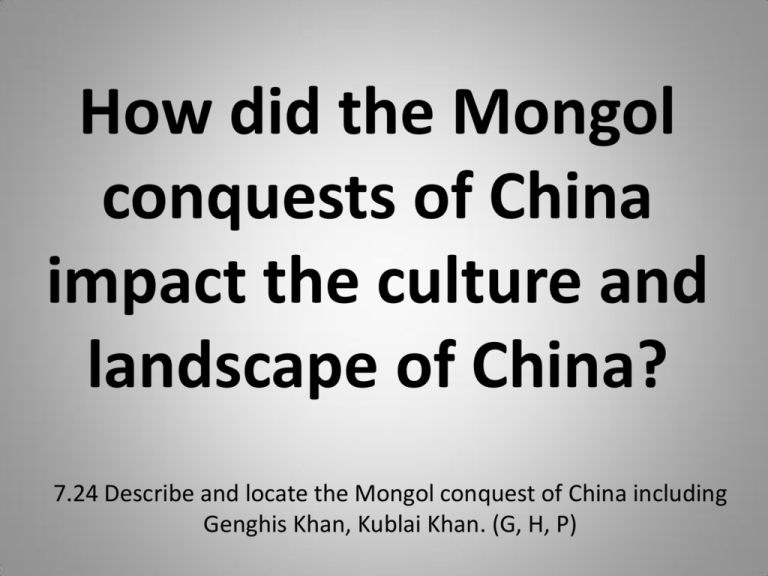
How did the Mongol conquests of China impact the culture and landscape of China? 7.24 Describe and locate the Mongol conquest of China including Genghis Khan, Kublai Khan. (G, H, P) Activator: To compare… Imagine if… “the U.S., instead of being created by a group of educated merchants & wealthy planters, had been founded by one of its illiterate slaves, who, by the sheer force of personality, charisma, & determination, liberated America from foreign rule, united the people,… invented a new system of warfare, marched an army from Canada to Brazil, and opened roads of commerce in a free-trade zone that stretched across the continents.” – Jack Weatherford in Genghis Khan Write a short opinion: Where would America be if it was conquered by such a people? The Mongols Slides 4-11 interesting facts The Good, the Bad & the Ugly THE GOOD (accomplishments & contributions) • Military Strategy & Innovation – Cavalry, Horse Archers, surprise attacks, sieges - Genghis first needed to disband tribal loyalties • Religious Tolerance (converted to all faiths in region except Hinduism) • Common Legal Code • Utilized skills of conquered peoples – artisans, soldiers THE GOOD (accomplishments & contributions) Discipline, obedience to own laws Sense of honor and loyalty, respect for these qualities in others, even opponents High status of women • These qualities attested to even by European observers who generally detested the Mongols THE GOOD (accomplishments & contributions) Discipline, obedience to own laws Sense of honor and loyalty, respect for these qualities in others, even opponents High status of women • These qualities attested to even by European observers who generally detested the Mongols THE BAD – (failures & struggles) • Constant in-fighting for power – “Khan” • Genghis never setup centralized rule, Kublai struggled with it (Yuan Dynasty) • Kublai failed to conquer Vietnam, Burma, Cambodia & Japan • Inability to control China without considerable force • Over-spending THE BAD, cont… • THE PLAGUE!!! • Over-extension – loss of control in Persia • Struggle between nomadic lifestyle and need to settle (centralized government) THE UGLY – (What!?! Those Mongols were CRAZY!!) • Surrender or Die • Looting & Destruction of Cities • Massacres (1.6 Million in 1 Afghan city, as many as 18.4 Million total killed) • Use of organized tactical terror • All exemplified by the Ilkhanate’s conquering of Middle East (Persia) THE UGLY, cont… • Lots of Babies - as many as .5% of the Earth’s current male population can trace genetic lineage back to Genghis (500 wives & concubines) • Plague catapults – biological warfare? • Strange diet, hairstyles and odor • Cannibalism? • Genghis’ funeral parade of death? Word Picture clue definition Mongol Nomads who come from the steppes northwest of China Steppe A large, dry, grass- covered plain difficult to live on with a harsh climate and limited resources. Khan Mongols lived in clans led by a khan, or ruler. What kind of people were the Mongols? Chronology of the Mongol Empire 1206-1227 Reign of Chinggis Khan 1211-1234 Conquest of northern China 1219-1221 Conquest of Persia 1237-1241 Conquest of Russia 1258 Capture of Baghdad 1264-1279 Conquest of southern China A Quick Background… • Nomads • Genghis Khan chosen leader • Need for water leads to conquest - Central Asia lacked rain for agriculture • Greatest Opportunity was trade – horses! Who were the Mongols? • From the steppes of eastern central Asia • Nomadic peoples • United under the leadership of Temujin a.k.a Chinggis Khan • “Courage Cultures” Declared themselves to be descendents of Huns who founded the 1st steppe empire in late Classical era. Inner Eurasia Steppe Outer Eurasia AP # 1 Why were the Mongols interested in Chineese conquests? From Temujin to “Universal Ruler” • Born 1167 • Orphaned at 10 • “Mastered the art of steppe diplomacy” : called for displays of personal courage in battle, combined with intense loyalty to allies, a willingness to betray others to improve one’s position and the ability to entice other tribes into cooperative relationships • United Mongol tribes into a single confederation • 1206 made Chinggis Khan Chinese depiction of Chinggis Khan Genghis Khan • Valued individual merit & loyalty • Fighting wasn’t honorable; winning was. So, used any means necessary to win (trickery, etc.) • Conscripted peasants: Mongols just didn’t understand peasants who seemed like grazing animals rather than real humans who ate meat. “They used same terms, precision, & emotion in rounding up yaks as peasants.” • Refugees preceded Mongol attack as people from outlying areas fled to cities for protection but overwhelmed the cities & spread fear • LOVED negative PR: allowed & encouraged true or false stories to be circulated in order instill fear. • Fought on the move: didn’t care if chased or fled (unlike sedentary soldier-farmer), just wanted to kill the enemy. Genghis Khan • In 25 years, subjugated more land & people than the Romans did in 400 years. • Destroyed LOTS of ‘less important’ cities – often along less accessible trade routes – to funnel commerce into routes that his army could more easily supervise and control. Actions of Genghis Khan Gathered an army of 100,000 soldiers Drafted a law code Created a group of tribal chiefs to help him plan military campaigns Chose army officers for ability, not family ties 1st conquered steppes Invaded China in 1211 then conquered kingdoms that controlled parts of the Silk Road Genghis Khan – innovations • Relied on speed & surprise and perfected siege warfare (not relied on defensive fortifications) • Used resources of land instead of relying on supply train • Allocated fallen soldiers’ share of loot to widow/children (ensured support) • Reorganized army so each unit had a mix of tribal/ethnic peoples and they had to live & fight together ---transcend kinship, ethnicity, & religion. • Religious tolerance • Instituted postal system for communication • Ordered writing system created • Abolished torture & insisted on rule of law (to which even the khan was accountable) What were the key factors that allowed fewer than 125,000 nomadic warriors to build the largest empire in world history? • Military prowess • Adaptation of local societies / talents • Timing: fragmentation of postclassical states AP# 2 Pair Share 1’s tell 2’s Share 3 reasons Genghis Khan was able defeat his enemies so easily. 2’s tell 1’s Share 3 innovations that Genghis Khan was famous for. Mongols conquered China and created a new dynasty that tried to conquer Japan and began trading with the rest of Asia. Kublai Khan became the new khan (ruler). He completely wiped out the Song Dynasty within a decade by conquering southern China. He moved the Capital from Karakorum to Khanbaliq (now modern Beijing). He set up the Yuan Dynasty. Yuan means beginning. It lasted for only about 100 years,and 30 of that was led by Kublai Khan This is a painting depicting Mongols under the Dynasty. Notice the dress of the people and skin color. The Mongol Interlude in Chinese History • Kubilai Khan, another grandson, moved against the Song in China and by 1271 his dynasty became the Yuan. • Kubilai forbid the Chinese from learning Mongol script, intermarriage was forbidden, and he refused to reestablish exams for civil service. • Despite restrictions, Kubilai was fascinated with Chinese civilization and adopted much of their culture into his court. He built his capital at Tatu in the north, a site occupied by previous dynasties, put the empire on the Chinese calendar, and introduced Chinese rituals and music into his own court. Society in the Yuan Dynasty • A new social structure emerged: – Mongols at the top – nomadic and Islamic allies were next – then north Chinese – finally ethnic Chinese and peoples of the south Mongol / Chinese Relations • Yuan Dynasty did a lot of good for the Chinese, but there were still tensions. – They spoke different languages. – Mongols did not treat the chinese as equals. – Punishments were harsher for chinese. • When Kublai died in 1294. – China experienced many problems, flooding and famine caused revolts. – 1368, the mongols were forced out. Mongol Empire 1294 Summarizer Write a $2.00 to $3.00 summary that will answer the Essential Question. Each word is worth $.10.
